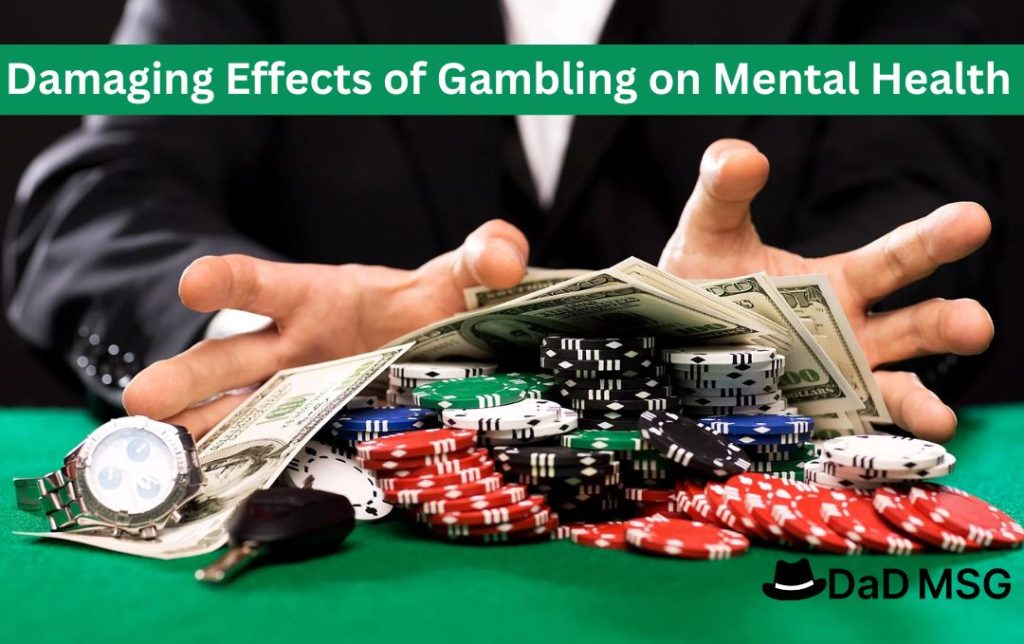Introduction
The damaging effect of gambling on mental health has drawn more and more attention in recent years. For those who develop a gambling addiction, the appeal of glamorous casinos, internet gambling sites, and the promise of quick fortunes can have negative effects. The significant negative impacts of gambling on mental health are examined in this blog, as well as the DaDMSG (Depression, Anxiety, Debt, Mental Health, Suicidal Ideation, and Gambling-related Disorders) that frequently go hand in hand with this destructive habit.
Gambling Effects on Mental Health
The relationship between gambling and mental health is complex and multifaceted. While occasional gambling for recreational purposes may not cause significant harm, problematic gambling habits can have severe consequences. Studies have indicated that individuals who struggle with gambling addiction are more likely to experience mental health issues such as depression, anxiety, and substance abuse disorders.
Gambling and Depression Statistics
Gambling and depression frequently coexist, creating a risky cycle that keeps people in a downward spiral. According to study, folks who have a gambling disorder are two to four times more likely than those who don’t to suffer from depression. Financial stress brought on by gambling losses, along with emotions of regret, shame, and helplessness, can cause or exacerbate depression symptoms.
Anxiety, Debt, and Mental Health
Another typical mental health issue among problem gamblers is anxiety. Chronic anxiety can be brought on by ongoing concerns about money problems, debt, and the impulse to gamble. Intense anxiety and panic attacks can be brought on by the fear of being found out, the need to preserve the appearance of normalcy, and the expectation of future losses.
Additionally, gambling can have disastrous financial repercussions. To fund their addiction, people frequently turn to borrowing money or using all of their credit cards, which leaves them insurmountably in debt. Massive stress brought on by debt can deteriorate mental health, impair relationships, and even lead to suicide thoughts.
Effects of Gambling on the Brain
Knowing how gambling affects the brain can help one understand how it affects mental health. The brain releases dopamine when a person gambles, a chemical linked to pleasure and reward. The joyful feeling brought on by this dopamine spike increases the desire to keep gambling.
The pleasure from gambling decreases as a result of the brain being desensitised to dopamine over time. Tolerance is a phenomena that encourages people to take on greater risks and stakes in order to experience the same degree of thrills, which feeds the addictive cycle.
Gambling activates the same brain pathways as drug and alcohol addiction, according to neuroimaging studies. People with gambling disorders exhibit structural and functional abnormalities in their brains that are comparable to those seen in people who struggle with substance misuse. This comparison draws attention to how addicting gambling is and how much it affects the brain.
Effects of Traffic on Mental Health
The impact of traffic on mental health should be taken into consideration even though it is not directly related to gambling. Increased stress, anxiety, and irritability can all be caused by long drives, heavy traffic, and aggressive drivers. Long-term exposure to stresses associated with traffic has been associated with an increased risk of mental health issues, including depression and sleep disorders.
People might investigate alternate modes of transportation, such as carpooling, public transportation, or cycling, to lessen the negative effects of traffic on mental health. The detrimental effects of traffic on mental health can also be lessened by engaging in stress-relieving activities like deep breathing exercises, mindfulness practises, or music therapy.
Conclusion
Gambling’s damaging consequences on mental health might result in suicidal thoughts, sadness, anxiety, and/or crushing debt. The interconnection of these problems is highlighted by the DaDMSG framework, which also stresses the necessity for comprehensive support and intervention techniques. It is essential to acknowledge the negative impacts of gambling on mental health in order to increase awareness, offer help to people who are impacted, and support preventive initiatives.
Read More:- Secrets About Aviator Game – How to Win Aviator Game
A holistic strategy is required to address the effects of gambling on mental health. This comprises:
- Promotion of education and knowledge about the dangers and effects of gambling addiction can assist people in making wise decisions and recognising warning signs. We can enable people to seek assistance when necessary by distributing knowledge through educational institutions, neighbourhood associations, and online forums.
- Implementing preventative programmes that focus on at-risk groups, such as children and people with mental health concerns already present, can help lower the prevalence of diseases associated to gambling. These programmes may promote resilient behaviour, encourage healthy coping processes, and use early intervention techniques.
- Therapy and Support: It’s critical to offer gambling addiction patients options for quick and efficient treatment. This may entail therapy, support groups, counselling, and specialist treatment facilities. For a thorough recovery, it is also essential to provide support services for co-occurring mental health issues like depression and anxiety.
- Financial counselling: It’s crucial to address the financial strain brought on by gambling. Offering debt management techniques and assistance in regaining financial stability to those who are stressed out by their gambling-related debt can be beneficial.
Governments and regulatory organisations have a vital role in reducing the detrimental effects of gambling on mental health. Protecting vulnerable people requires tougher controls on gambling marketing, enforcement of age limitations, and funding for projects in treatment and prevention.
In conclusion, it is impossible to overstate how bad gambling is for your mental health. The deep connections between depression, anxiety, debt, mental health illnesses, suicidal thoughts, and gambling addiction are highlighted by the DaDMSG framework. We can create efficient tactics to prevent and handle gambling-related troubles by comprehending these relationships. Prioritizing education, prevention, treatment, and support services is essential to preserving the mental health of those impacted by gambling addiction both individually and in communities.
Read More:-


